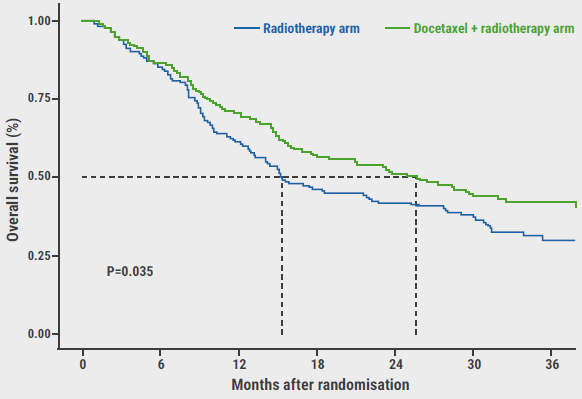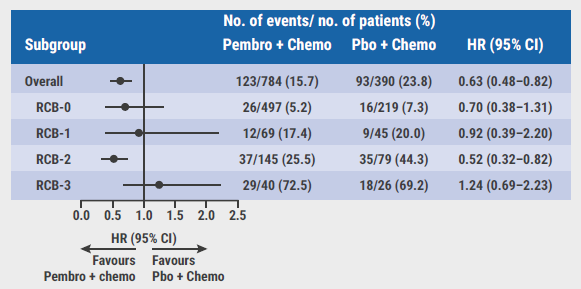https://doi.org/10.55788/56cd3a21
Activation of the epidermal growth factor receptor (EGFR)-Ras-Raf-MEK-ERK pathway plays a part in patients with KRAS wildtype pancreatic cancer [1]. Therefore, the phase 3 NOTABLE trial (NCT02395016) randomised patients with KRAS wildtype locally advanced or metastatic pancreatic cancer to gemcitabine and placebo (n=41) or gemcitabine plus nimotuzumab (n=41), which is an EGFR-targeting monoclonal antibody. OS was the primary endpoint of this study. Prof. Shukui Qin (Cancer Center of Jinling Hospital, China) presented the results [2].
The combination therapy arm outperformed the placebo arm significantly for OS (10.9 vs 8.5 months; HR 0.50; P=0.024), decreasing the risk of mortality by 50%. In addition, the 1-year and 3-year OS rates were 43.6% and 13.9% for patients treated with nimotuzumab and 26.8% and 2.7% for patients who received placebo.
Importantly, the combination therapy was well tolerated and no substantial increase in grade 3 adverse events was observed among patients who received nimotuzumab. The most frequently reported adverse events in the nimotuzumab arm were neutropenia (11.1%), leukopenia (8.9%), and thrombocytopenia (6.7%). Prof. Qin added that the OS curves of the 2 treatment arms separated rather late, suggesting there might be subgroups within the KRAS wildtype subgroup of tumours that behave differently in response to nimotuzumab.
This trial demonstrated that it is worth determining KRAS status in pancreatic cancer. Gemcitabine plus nimotuzumab displayed itself as a novel option for patients with KRAS wildtype mPDAC/LAPC who otherwise would have received only gemcitabine. ”It would be interesting to see how combination chemotherapy would behave in the KRAS wildtype mPDAC population,” concluded Thomas Seufferlein (Ulm University Hospital, Germany), discussant of this session [3].
- Luchini C, et al. J Exp Clin Cancer Res. 2020;39(1):227.
- Qin S, et al. Nimotuzumab combined with gemcitabine versus gemcitabine in KRAS wild‐type locally advanced or metastatic pancreatic cancer: a prospective, randomized‐controlled, double‐blinded, multicenter, and phase III clinical trial. J Clin Oncol. LBA4011, ASCO 2022 Annual Meeting, 3–7 June, Chicago, IL, USA.
- Seufferlein T, et al. Is it worth determining KRAS Status in Pancreas Cancer? Discussant LBA 4011, ASCO 2022 Annual Meeting, 3–7 June, Chicago, IL, USA.
Copyright ©2022 Medicom Medical Publishers
Posted on
Previous Article
« Autologous stem cell transplantation plus RVd improves PFS in multiple myeloma Next Article
To resect or not to resect primary tumours in stage IV colon cancer? »
« Autologous stem cell transplantation plus RVd improves PFS in multiple myeloma Next Article
To resect or not to resect primary tumours in stage IV colon cancer? »
Table of Contents: ASCO 2022
Featured articles
Breast Cancer
Sacituzumab govitecan meets primary endpoint
Shaky OS results of palbociclib in ER-positive/HER2-negative breast cancer
Practice-changing results of T-DXd in HER2-low breast cancer
SET2,3 to inform on chemotherapy decisions in ER-positive breast cancer
Metastasis-directed therapy fails in oligometastatic breast cancer
Analysis by residual cancer burden further clarifies effect of pembrolizumab
Contribution of metastatic therapies on mortality reduction in breast cancer
Radiotherapy may be omitted in breast cancer patients
Promising data for ribociclib after progression on ET plus CDK4/6 inhibitors in HR-positive/HER2-negative metastatic breast cancer
7-gene biosignature: Benefits of endocrine therapy and radiotherapy in breast cancer risk groups
Lung Cancer
Additional tiragolumab does not help patients with untreated small cell lung cancer
Success for serplulimab plus chemotherapy in small cell lung cancer
Adagrasib safe and clinically active in non-small cell lung cancer
Long-term benefits of combined immunotherapy over chemotherapy in non-small cell lung cancer
Effect of KRAS mutations and PD-L1 expression on therapy response in non-small cell lung cancer
Melanoma
First results on distant metastasis-free survival in stage II melanoma
Higher response rates for concurrent triple therapy versus sequential therapy in melanoma
Genitourinary Cancers
Exploratory treatment options fail in ccRCC
Adjuvant everolimus did not benefit high-risk renal cell carcinoma
Cabozantinib fails as first-line maintenance therapy in urothelial cancer
177Lu-PSMA-617 is a valid treatment option for PSMA-positive mCRPC
Enzalutamide performs well in metastatic hormone-sensitive prostate cancer
Haematologic Malignancies
Autologous stem cell transplantation plus RVd improves PFS in multiple myeloma
Novel first-line treatment option for mantle cell lymphoma
Promising results for novel CAR-T therapy in relapsed/refractory multiple myeloma
Gastrointestinal Cancers
Panitumumab beats bevacizumab in RAS wildtype left-sided metastatic colorectal cancer
Spectacular results for dostarlimab in mismatch repair deficient rectal cancer
Triplet chemotherapy beats doublet chemotherapy in colorectal cancer liver metastases
To resect or not to resect primary tumours in stage IV colon cancer?
Novel treatment option for KRAS wildtype pancreatic cancer
Gynaecological Cancers
Primary results of rucaparib in ovarian cancer
Trabectedin not superior to chemotherapy in recurrent epithelial ovarian cancer
Encouraging results of relacorilant in ovarian cancer
Miscellaneous Topics
Bacterial decolonisation effective against radiation dermatitis
New standard-of-care for cisplatin-ineligible locally advanced head and neck squamous cell carcinoma
Ifosfamide is likely to be the go-to therapy in recurrent Ewing sarcoma
Dabrafenib plus trametinib candidates for standard-of-care in BRAF V600-mutated paediatric low-grade glioma
Related Articles



June 21, 2022
ASCO 2022 Highlights Podcast
© 2024 Medicom Medical Publishers. All rights reserved. Terms and Conditions | Privacy Policy
HEAD OFFICE
Laarderhoogtweg 25
1101 EB Amsterdam
The Netherlands
T: +31 85 4012 560
E: publishers@medicom-publishers.com

